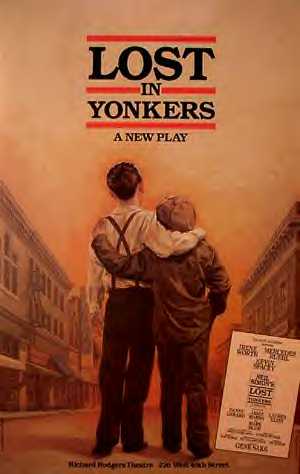
CEDAR CITY — The setting is Yonkers, New York City. The time is 1942. And the characters are the Kurnitz family, the descendants of a Jewish woman who emigrated from Germany in her childhood. From this somber jumping point, Neil Simon’s script presents a delicate combination of humor and thoughtful, character-driven drama.
The curtain rises on brothers Jay (Trent Dahlin) and Arty (Conor Christensen) Kurnitz, sitting uncomfortably in their grandmothers’ be-doilied apartment while their father, Eddie (Richard Hill), and grandmother (Chrystine Porter Hyatt) talk in the other room. The boys recently lost their mother to cancer and their father acquired more debt than he could manage to pay her medical bills. The purpose of this visit is for Eddie to persuade his mother to watch the boys for the next several months while he goes on the road to earn enough to pay back his debts. The only person who seems at all happy about the arrangement is the boys’ Aunt Bella (Barb Christensen), who is in her thirties, but has the mental abilities of a child.
Persuaded by Eddie’s desperation and Bella’s enthusiasm, Grandma Kurnitz takes the boys in, subjecting them to the unrelenting style of parenting she applied to her own children. Grandma Kurnitz has found solace from a life of hardship in unflinching stoicism and stubborn independence, and her style of nurturing entails instilling those same virtues in her offspring.
The boys resent being separated from their indulgent father only to be subjected to their disciplinarian grandmother’s rule. But Jay and Arty’s lives of drudgery, earning their keep through hours of unpaid labor in their grandmother’s shop, are soon broken up by an unexpected visitor. Uncle Louie (David Meyers) may or may not be on the run from the law, but he certainly is on the run from the mob. And the perfect hiding place just happens to be the same sofa-bed that Jay and Arty are already sharing. Things get even more stressful for the boys when both Uncle Louie and Aunt Bella take them into their confidence, sharing secrets they know would precipitate the wrath of Grandma Kurnitz.
Directed by Richard Bugg, Lost in Yonkers achieved just the right tone in each scene. As the audience learns more of the secrets and burdens borne by the Kurnitz family, finding the right balance for the comedic elements becomes even more crucial for the play’s mood and pacing. Under Bugg’s direction, the cast milked the humor out of the script without distracting from the development of the characters and story.
The cast was wonderful. Dahlin and Christensen had a believable chemistry as the brothers Jay and Arty. Dahlin, especially, presented the air of an adolescent trying to act like an adult, but finding himself in situations that were still beyond his control. As Arty, Christensen presented a childlike innocence about the world around him. Christensen’s portrayal fit well in the more lighthearted scenes, but I found his reactions unrealistic and even cartoonish during scenes that required more depth.
Barb Christensen filled the role of Aunt Bella in a manner that was at once endearing and uncomfortable and entirely right. The character of Bella presents some of the play’s most complex themes, as she yearns to live the same things in life other adults have but lacks the kind of understanding or independence that would allow her achieve them. Aunt Bella was often more honest than the other members of the Kurnitz family could be, and Christensen delivered her lines with an unabashed lack of self-awareness that made them seem natural.
Grandma Kurnitz (Chrystine Porter Hyatt) felt like a real person to me. Hyatt presented the hardened façade and unflinching demeanor of one who has become toughened after a lifetime of adversity. Richard Hill’s performance as Eddie felt emotionally genuine and culturally authentic. David Meyers, as Uncle Louie, was a pleasure to watch. His tough exterior provided a thin veil for a doting brother to Bella and uncle to Jay and Arty, and even his relationship with Grandma Kurnitz seemed to be the most open of Kurnitz siblings’. And even though her role was small, Sally Hunter Jensen made the largely comedic role of Aunt Gert believable and sympathetic.
Period costumes (Ellen Osborne) and the familiar surroundings of an old woman’s apartment (scenic design by Daniel Whiting and Taylor Tripp) made the period easily recognizable and set an austere mood. The lighting and sound (Michael Grey, Marty Shurtleff, Camden Meyers) were flawless and unobtrusive, which was exactly what this play demanded of them.
Neil Simon’s script explores some very uncomfortable topics but uses humor to make the experience enjoyable. And The Neil Simon Festival’s production of Lost in Yonkers made it easy to see why the script won a Pulitzer Prize for Drama. The set and costumes were impeccable, the talented cast made each character feel relatable despite their differences, and the direction achieved the perfect balance between humor and more serious thematic elements. For fans of Neil Simon or fans of good theater generally, this production is worth seeing.
[box type=”shadow”]The Neil Simon Festival’s production of Lost in Yonkers is playing at The Heritage Theatre in Cedar City at 2:00 PM on August 3, 6, and 10, and at 7:30 PM on August 1 and 5. Tickets are $10-26. For more information, visit http://www.simonfest.org. [/box]
